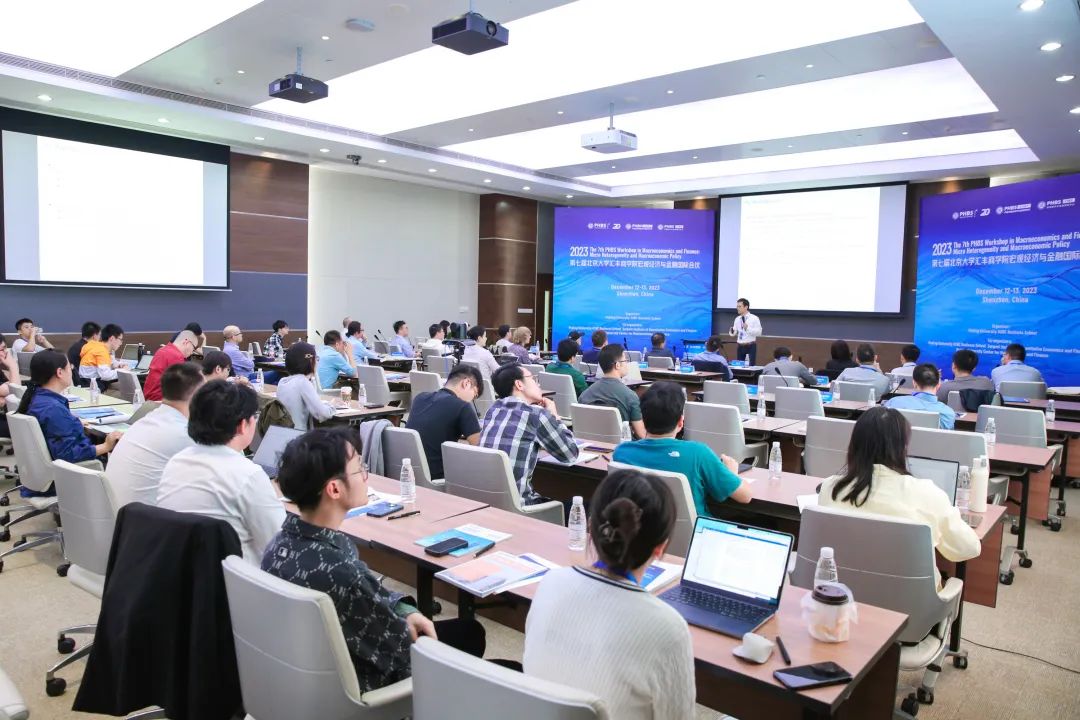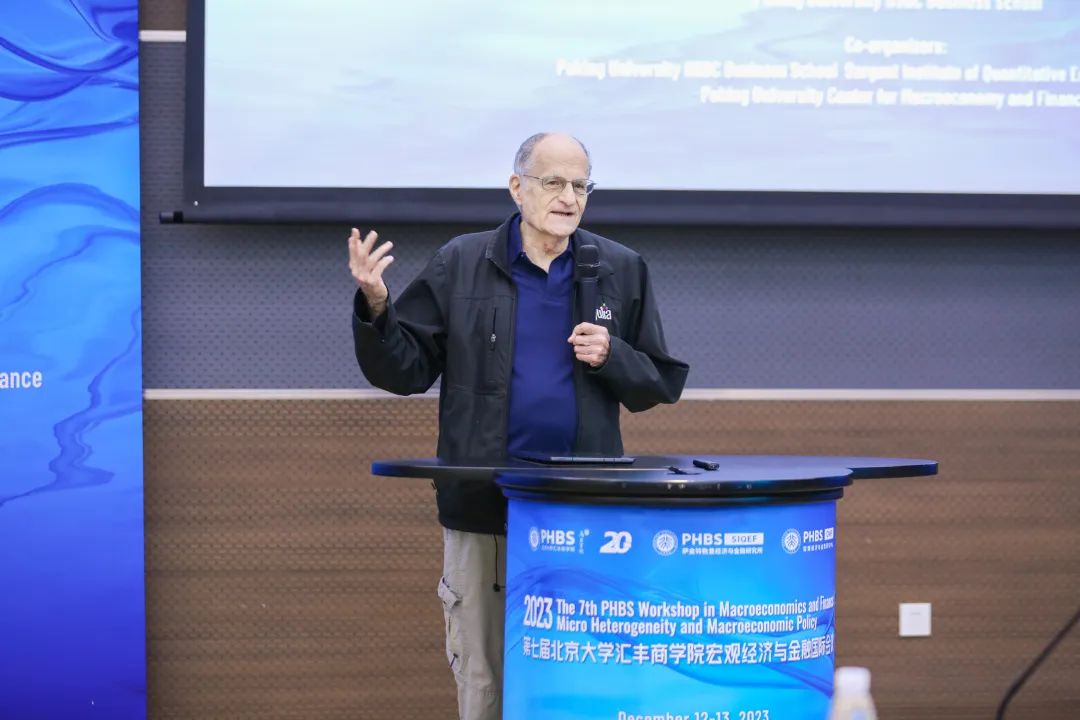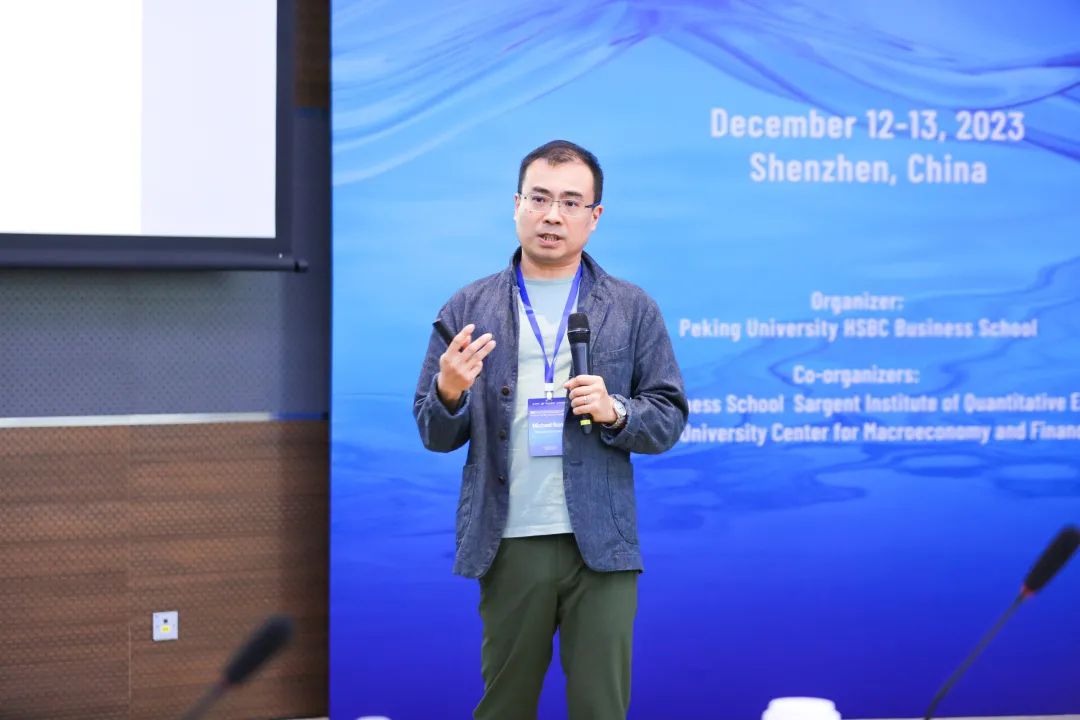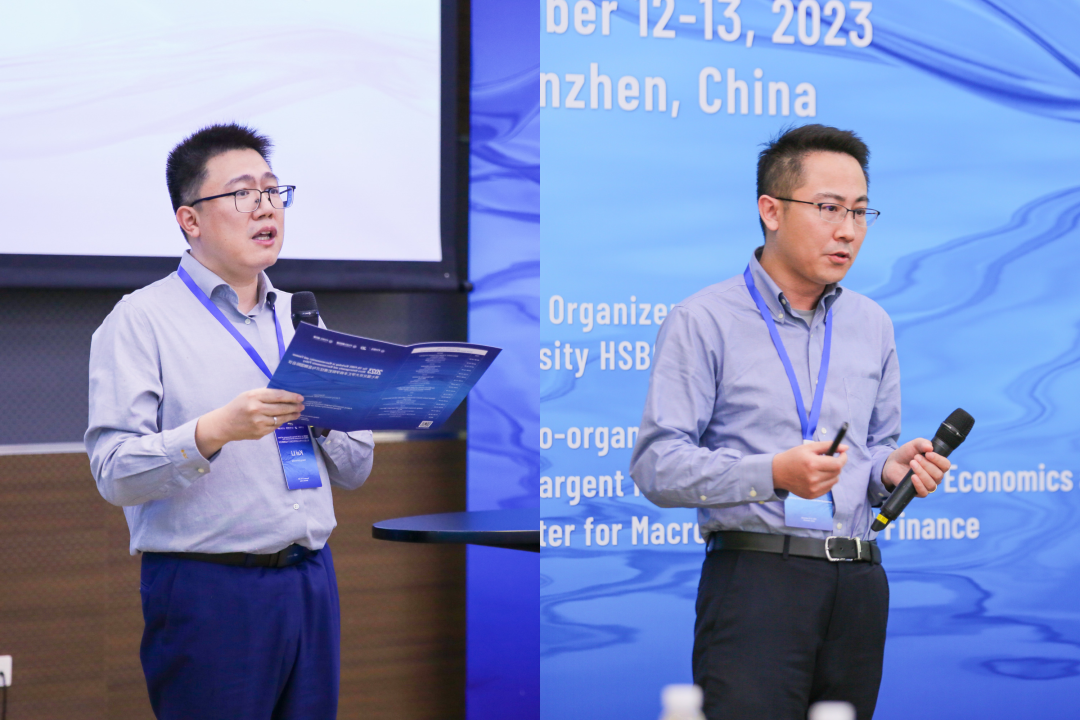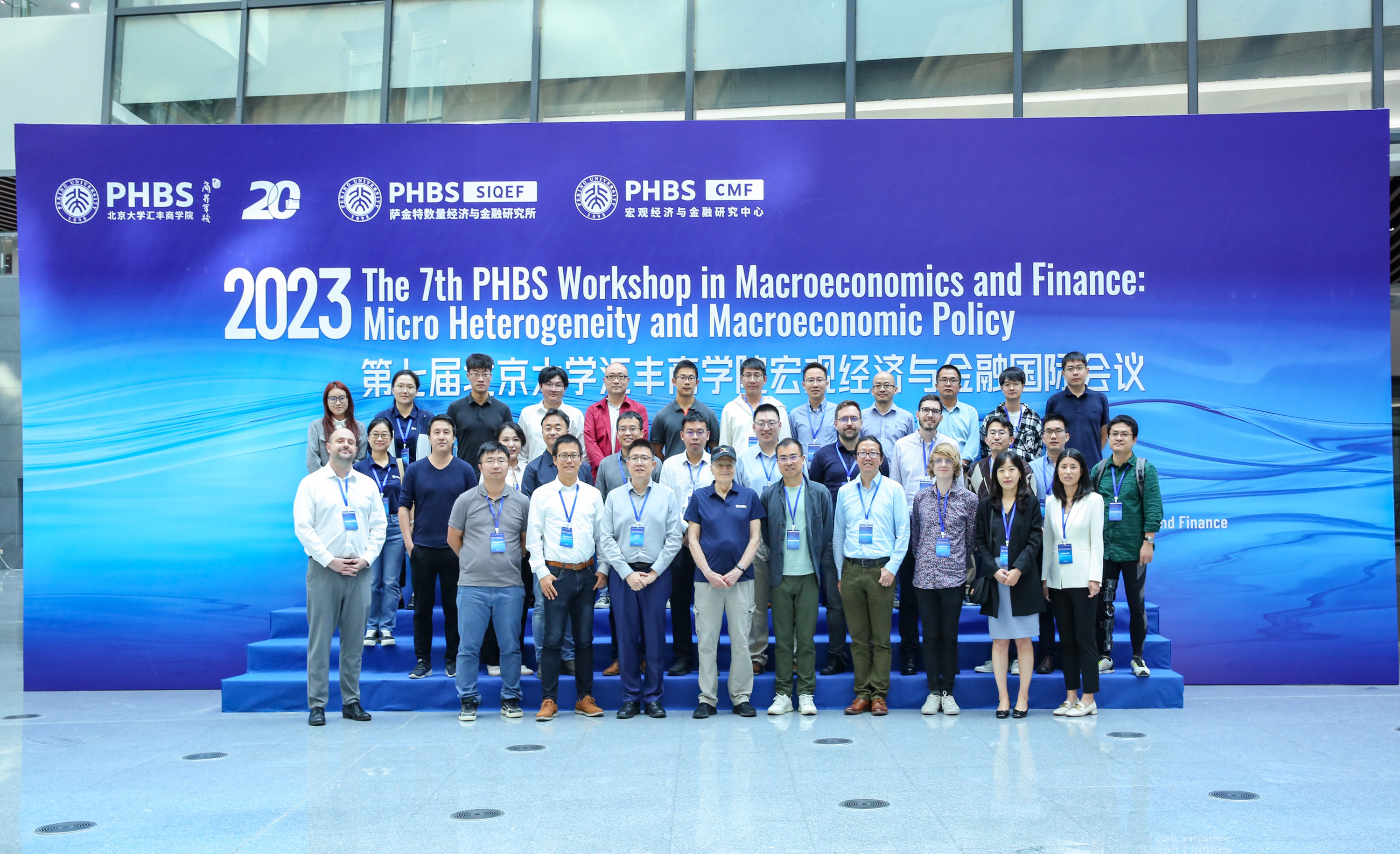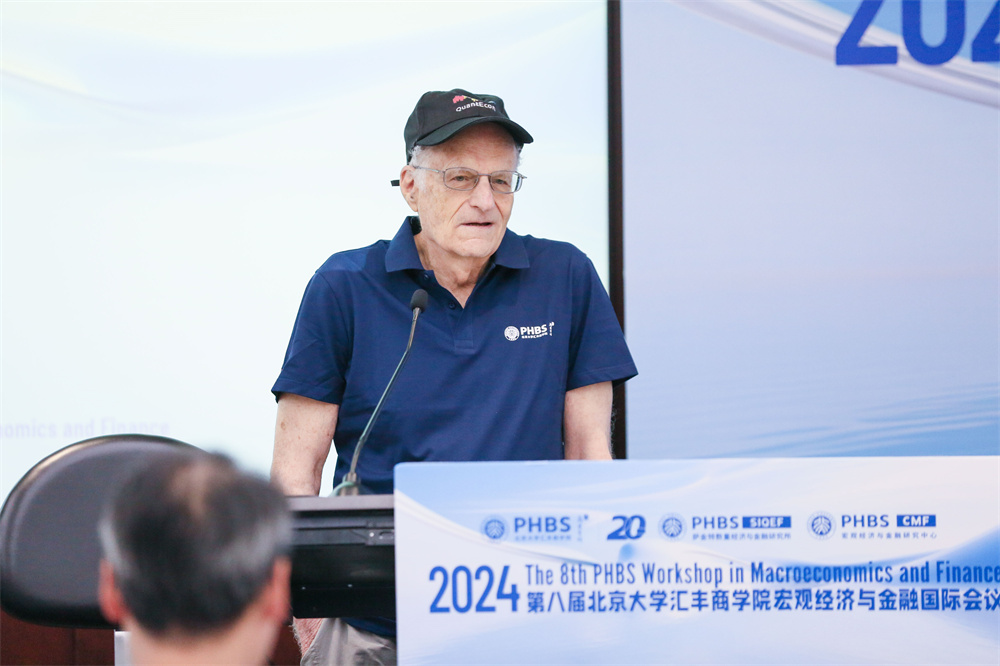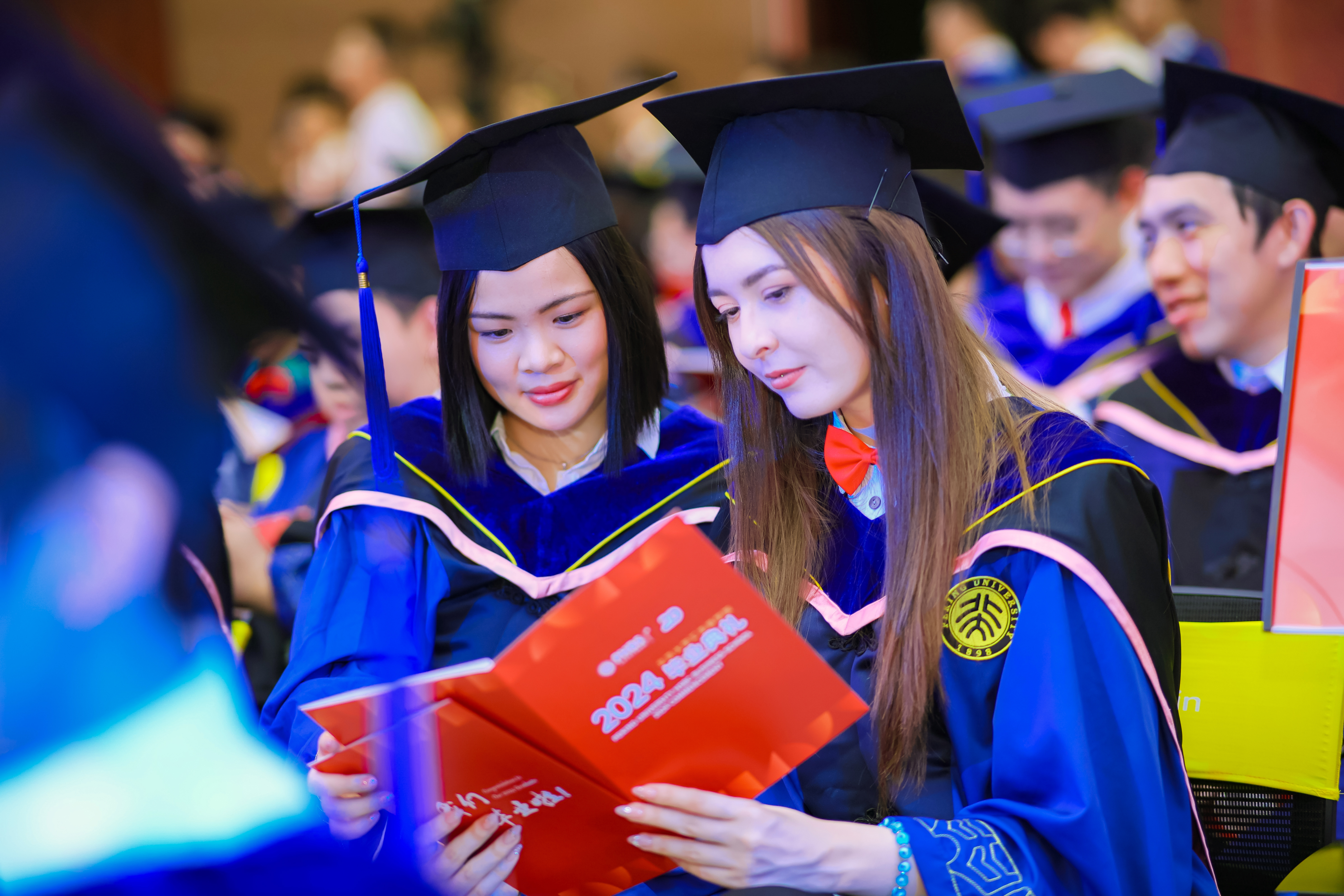The 7th PHBS International Workshop in Macroeconomics and Finance was held at Peking University HSBC Business School (PHBS) on December 12 to 13, 2023. More than 80 young scholars in the field of macroeconomics and finance attended the event to exchange academic achievements and keep track of the latest breakthroughs with renowned scholars from Cornell University, University of Southern California, Queen Mary University of London, National Center for Scientific Research, Seoul National University, University of Hong Kong, Hong Kong University of Science and Technology, Chinese University of Hong Kong, Peking University, Tsinghua University and other top universities at home and abroad, industry experts from the Federal Reserve Bank of San Francisco.
Opening ceremony
Thomas Sargent, Nobel laureate in Economics and honorary director of Sargent Institute of Quantitative Economics and Finance (SIQEF) at PHBS
Professor Thomas Sargent delivered opening remarks. By recalling his journey in economic research, he emphasized the importance of integrating economic theories with practice, and how these theories can be used to explain and predict economic trends. Subsequently, Professor Sargent shifted his focus to the current international economic situation, probing the main challenges faced by the global economy, including slowing growth, trade tensions, and financial market instability. He highlighted how technological advancements and globalization have transformed economic structures and how policymakers need to adapt to these changes to promote growth and stability.
By analyzing the role of monetary and fiscal policies in the current economic context, he pointed out that given the low-interest-rate environment and rising government debt levels, traditional macroeconomic policy tools might need reevaluation and adjustment. Therefore, he suggested that policymakers should pay more attention to structural reforms to enhance productivity and economic potential.
Finally, Professor Sargent underscored the importance of international cooperation in addressing global economic issues. He called for joint efforts by governments and international institutions to tackle the challenges posed by globalization, ensuring inclusive and sustainable economic growth. He concluded by encouraging participants to work together towards building a more prosperous and stable global economy.
Professor Song Zheng from Chinese University of Hong Kong
Professor Song Zheng offered insights into his collaborative paper titled "The Mandarin Model of Growth." The study delves into the macroeconomic factors contributing to China's rapid economic growth and deceleration, with a central focus on the bureaucratic model. This model examines the interactions between local governments and the private sector and their influence on the Chinese economy. Researchers utilized a dynamic general equilibrium model to study local government decisions related to infrastructure investments and borrowing. They designed counterfactual experiments to explore the impact of removing career incentives and restricting local government borrowing on Gross Domestic Product (GDP). Their findings indicated that before 2008, local officials were highly motivated by career incentives, leading them to actively invest in infrastructure to boost their performance records. However, over time, this motivation waned, likely due to growing local government debt, increasing sensitivity to debt risks, or central government policies aimed at curbing excessive borrowing. This research offers valuable insights into the complex relationship between Chinese local government behavior and economic growth.
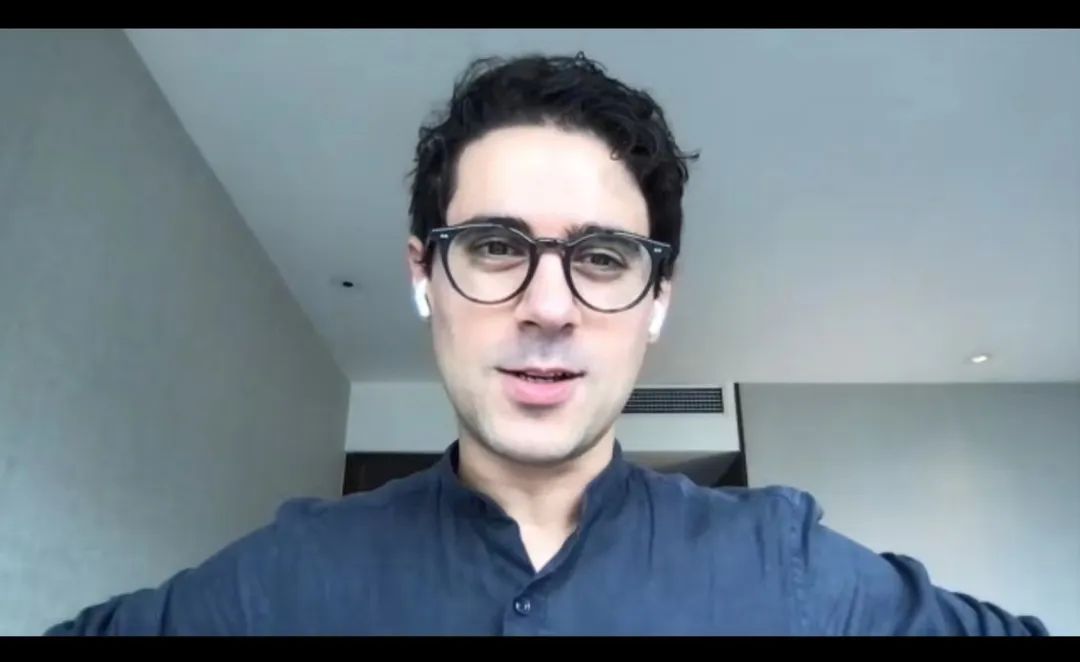
Professor Alireza Tahbaz-Salehi from Northwestern University
Professor Alireza Tahbaz-Salehi provided insights into the collaborative paper, "The Macroeconomics of Supply Chain Disruptions," co-authored with Daron Acemoglu. Their research delves into the macroeconomic implications of intricate supply chains in modern economies, with a particular focus on the repercussions of supply chain interruptions on productivity and the broader economy. They introduced a macroeconomic model with three critical components: firm-specific relationships, non-competitive frameworks, and essential extensive margin adjustments. Their findings highlighted that supply chain disruptions could have consequences not only for individual companies but also for the entire economy due to spillover effects. By addressing the vulnerability and efficiency of supply chains and how these factors manifest at the macroeconomic level, their research underscores a delicate balance between economic efficiency and fragility, where supply chains are more active and resilient during periods of high productivity but may disintegrate during productivity slowdowns, leading to a cascade of relationship failures. He concluded by emphasizing the importance of comprehending and mitigating supply chain disruptions and underscoring the significance of considering the macroeconomic repercussions when designing and managing supply chains.
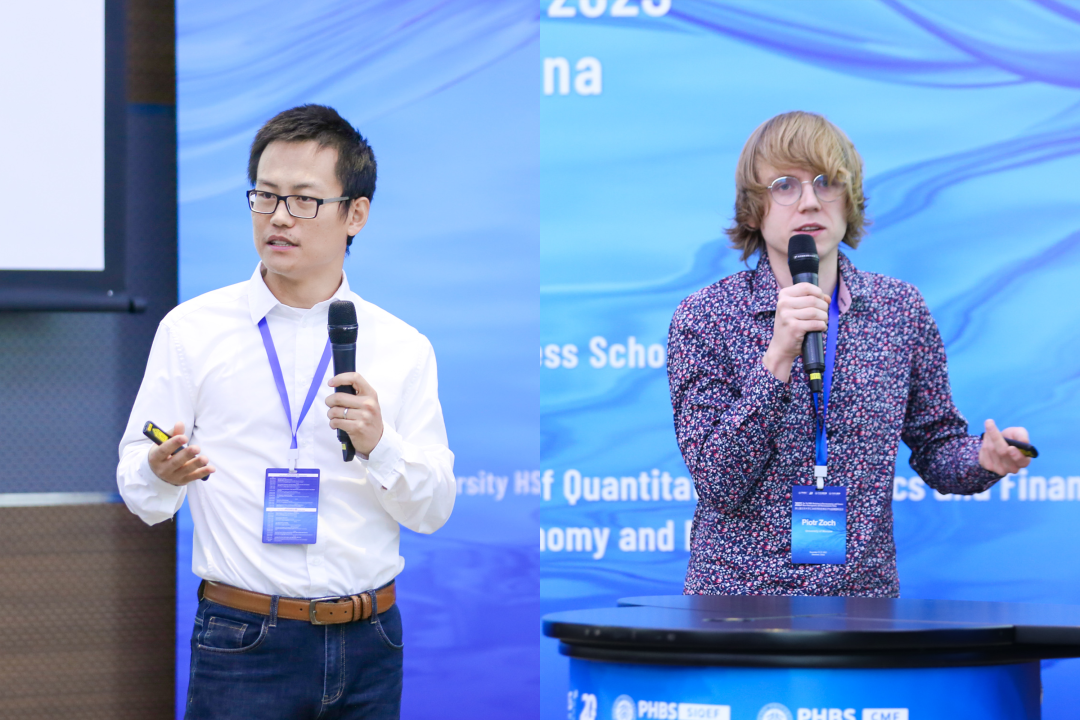
Li Wenhao and Piotr Żoch
Assistant Professor Li Wenhao from the University of Southern California introduced his paper titled "Firm Quality Dynamics and the Slippery Slope of Credit Intervention." The article employs a dynamic two-sector model to analyze the long-term effects of credit intervention on the dynamics of firm quality. In a laissez-faire economy, crises have a cleansing effect as low-quality firms face stricter financial constraints during these times, resulting in lower Tobin's q compared to high-quality firms. Therefore, the end of an economic crisis is accompanied by an increase in the proportion of high-quality firms. Professor Li pointed out that credit intervention if properly designed could enhance societal welfare compared to laissez-faire conditions. However, credit intervention suppresses the cleansing effect and distorts the distribution of firm quality by inducing excessive investment by low-quality firms during both crisis and normal periods. This kind of intervention could exhibit a "slippery slope" effect. Current intervention skews the distribution of firm quality downward, causing the economy to enter the next crisis with lower overall productivity, requiring larger-scale intervention. Larger-scale intervention leads to more severe distortions, necessitating even larger-scale intervention in the future. Assistant Professor Piotr Zoch from the University of Warsaw outlined the paper's model framework, offered viewpoints on the model's setup, and provided policy suggestions on how to avoid the "slippery slope" effect.
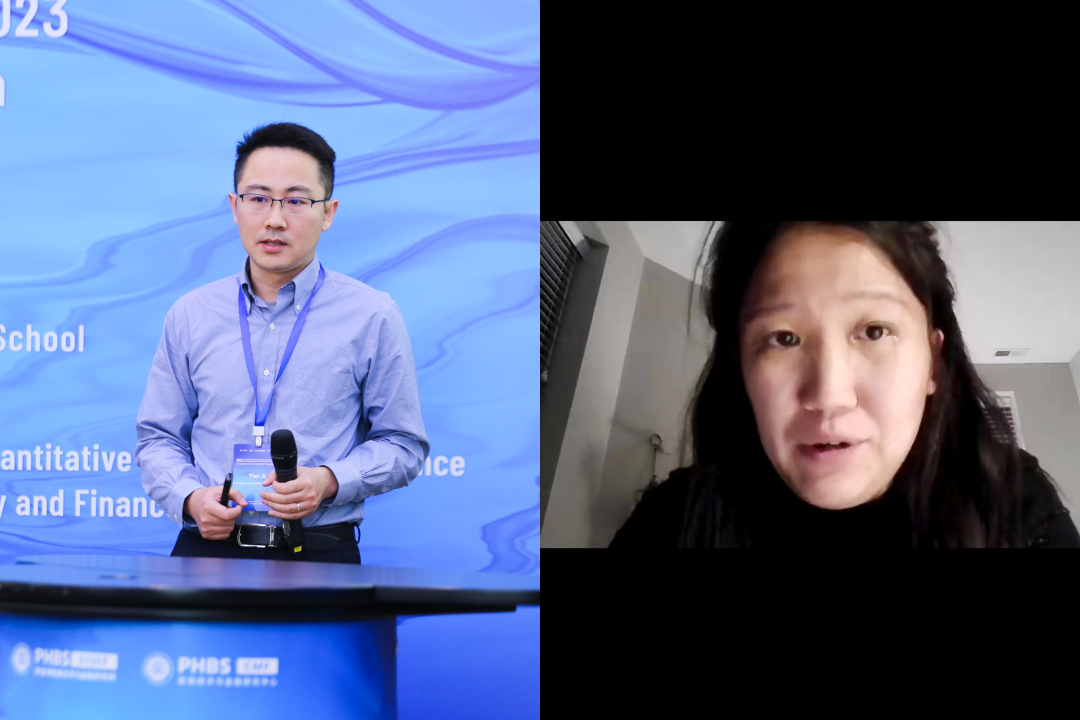
Ji Yan and Jasmine Xiao
Associate Professor Ji Yan from the Hong Kong University of Science and Technology presented the collaborative paper "Misallocation and Asset Prices" by Professor Winston W. Dou of the University of Pennsylvania, Dr. Tian Di from the Hong Kong University of Science and Technology, and Professor Wang Pengfei from Peking University. It explores the interplay between resource misallocation and asset pricing against a backdrop of financial friction. By employing a model that incorporates technological innovation and macroeconomic elements, the study revealed how misallocation could affect overall productivity and asset values. Their findings indicated significant impacts of misallocation-induced fluctuations on asset pricing, predicting declines in R&D, consumption, and output growth. Moreover, lower levels of misallocation at the industry level could encourage higher R&D activities, with empirical data underpinning these insights. Assistant Professor Jasmine Xiao from University of the Notre Dame shared her views and engaged in in-depth debates on the measurement of misallocation, its influence on innovation margins, and the degree of misallocation in the U.S. economy.

Tim Lee and Anson Zhou
Associate Professor Tim Lee from Queen Mary University of London introduced his paper titled "Transforming Institutions: Labor Reallocation and Wage Growth in a Reunified Germany." The article explores how the allocation of workers across firms and factories affects wage growth, and examines how labor institutions, barriers to job mobility, and hiring/firing restrictions impact labor (mis)allocations. Under the background of German reunification, Professor Lee utilized matched employer-employee data constructed from German social security records to investigate the labor reallocation that occurred in East Germany following reunification. He also constructed a theoretical model to simulate the economy in East Germany and uses the model to explore the changes in the economic equilibrium before and after German reunification. The research findings indicated that the sharp growth in East German wages strongly correlated with a rapid reallocation of workers across plants within East Germany. Assistant Professor Anson Zhou from the University of Hong Kong summarized the paper's content, outlined its contributions, provided suggestions for the empirical section, and offered viewpoints on both the model's setup and its stretch.
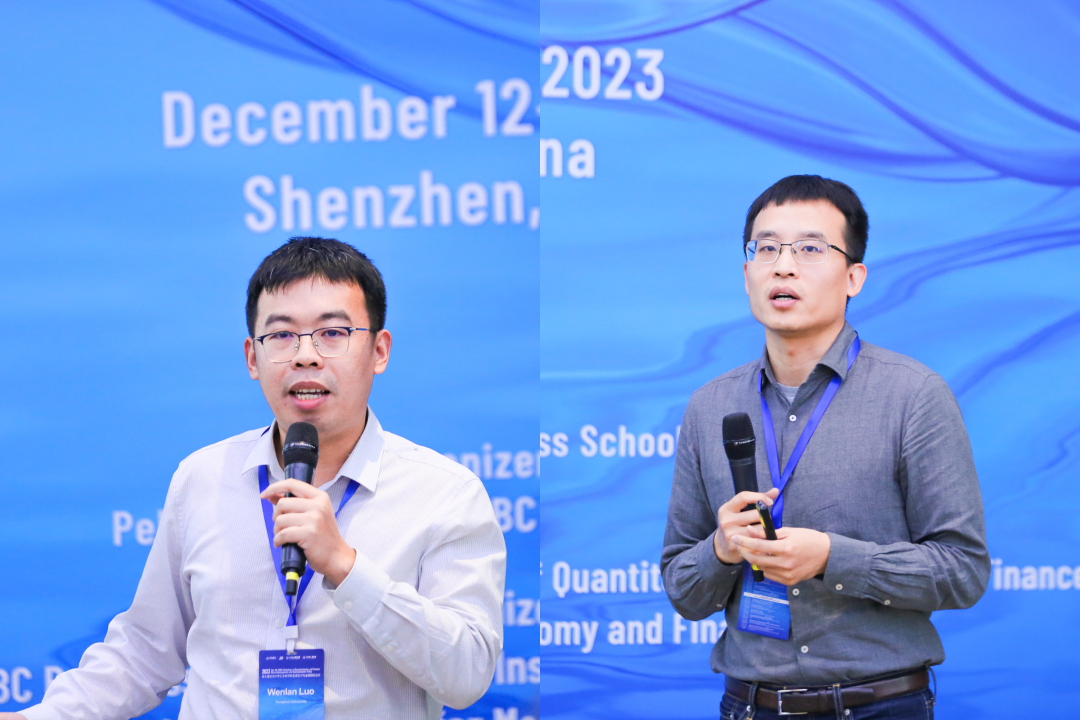
Luo Wenlan and Li Minghao
Associate Professor Luo Wenlan from Tsinghua University introduced "Financing Multinationals". Many literature emphasizes the important role of technology in cross-border trade. Professor Luo's article explores the role of cross-border production (MP) in cross-border financing from the perspective of cross-border production. The article established a multi country general equilibrium model for multinational corporations and explored the relationship between FDI, MP, and financial friction. Finally, the model found from a static perspective that factors related to financial market environment and productivity are equally important, and from a dynamic perspective, it indicated that changes in financial market conditions accounted for a significant share of foreign direct investment from 2001 to 2012. Assistant Professor Minghao Li from Peking University National School of development discussed topics such as empirical methods, bond markets and interest rates, and welfare utility.

Xie Shihan and Pei Guangyu
Assistant Professor Xie Shihan from University of Illinois, Urbana-Champaign introduced her paper “Macroprudential Policy and Housing Market Expectations”. The paper investigates the relationship between macroprudential policy and housing market expectations, finding that macro-prudential policies could move consumers expectations of national house price where a tightening (loosening) of a policy ratio drives down (up) consumers’ house price expectations, and asymmetry in the sign of policy change and geographical heterogeneous effects. The paper showed that design of the online “strategic” survey on housing market expectations is new for the existing literature. Assistant professor Pei Guangyu from The Chinese University of Hong Kong discussed topics such as asymmetry and geographical heterogeneity.
Heitor Pellegrina and Ishan Nath
Assistant professor Heitor Pellegrina from University of Notre Dame presented his research "Deforestation: A Global and Dynamic Perspective." In the context of globalization and deforestation, they used a global economic model, incorporating dynamic multi-sector trade theory, to analyze the effects of trade barriers on deforestation using national-level data from 1990-2020. Their methodology integrated empirical models to scrutinize the role of structural changes and comparative advantages in land use. The study revealed that lower global trade costs could significantly reduce deforestation rates, especially in Brazil. Ishan Nath from Federal Reserve Bank of San Francisco discussed topics on the model's implications and methodologies.
Qiu Xincheng and Piotr Denderski
Assistant Professor Qiu Xincheng from Arizona State University's Department of Economics introduced his paper "Precautionary Mismatch". The paper constructed a framework involving two-sided heterogeneity, search frictions, and incomplete markets to explore how the wealth held by workers affects the matching between workers and firms in the labor market. In the theoretical model, both workers and firms face a trade-off between the speed of matching and the returns: Wealth-poor workers speed up job search by accepting a wider range of jobs at the cost of lower payoffs (we call this phenomenon "precautionary mismatch"), reducing allocative efficiency of the labor market. Based on empirical data from NLSY79 and O*NET, the paper calibrated the model to the U.S. economy and suggested that if workers could be reallocated to the "right" jobs, total output would increase by around 3%. Assistant Professor Piotr Denderski from the University of Leicester's Department of Economics discussed the model's setup, provided suggestions for the empirical section, and offered his viewpoints on policy experiments.
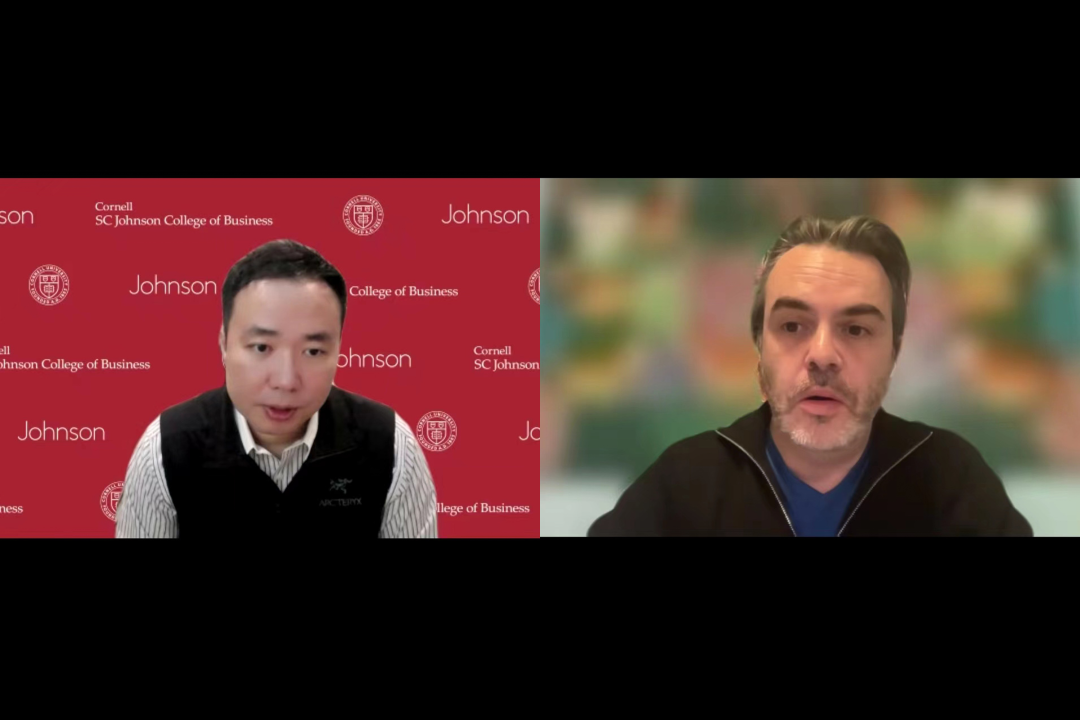
Lin William Cong and Julien Prat
Professor Lin William Cong from Cornell University provided an overview of their collaborative paper, "The Tokenomics of Staking," which centers on exploring the pivotal role of staking mechanisms in the cryptocurrency market. Through empirical research using extensive cryptocurrency market data, they examined the relationships between staking ratios, staking rewards, wealth concentration, and their impact on cryptocurrency prices. One key finding of their research is that higher staking reward rates often stimulate increased staking activity, typically accompanied by rising cryptocurrency prices. This underscores the potential value of staking mechanisms in enhancing network security and positively influencing cryptocurrency market health and stability. Furthermore, they explored the impact of staking economics on blockchain technology and decentralized finance. Staking has become a cornerstone of these domains, offering participants profit opportunities and contributing to the stability and growth of decentralized networks. Research Director CNRS, CREST Julien Prat engaged in a thorough discussion of staking economics, market dynamics, and their future implications.

Yena Park and Zhu Lijun
Associate Professor Yena Park from Seoul National University presented the paper “Optimal Firm Regulation with Labor Market Monopsony” coauthored with Hanvit Kim, which explores the optimal redistribution policy in a monopolistic labor market. They considered the case where firms have wage-setting power and workers have idiosyncratic preferences across firms and analyzed the constrained planner’s problem and the trade-off between redistribution and allocative efficiency. Results showed that optimal redistribution policy required wage compression, which means providing higher subsidies to low-productivity firms to encourage them to pay higher wages and employ more workers. They also found that different inequality and sorting mechanisms could affect the shape of the optimal policy. Zhu Lijun, Assistant Professor from the Institute of New Structural Economics at Peking University, started a discussion on topics such as worker subsidies and monopoly power heterogeneity.
Li Kai and Ji Yan
PHBS Associate Professor Li Kai presented the paper “Leasing, Pecuniary Externalities, and Aggregate Efficiency”. He argued that leasing could improve efficiency by mitigating pecuniary externalities in the context of capital misallocation caused by financial frictions. By using US firm-level leasing data and a dynamic general equilibrium model, Professor Li and his coauthors studied the effects of leasing on capital allocation and welfare. Their results showed that leasing could relax financial constraints, increase the use of new investment and leased capital, lower the price of old capital, and mitigate distributional and collateral externalities. They also found that ignoring the leasing market could lead to suboptimal tax/subsidy policies. Professor Li concluded that leasing could serve as an important topic in the intersection of finance, macroeconomics, and accounting. Associate Professor Ji Yan from the Hong Kong University of Science and Technology discussed topics such as the relationship between leasing and other methods that could alleviate financial frictions.
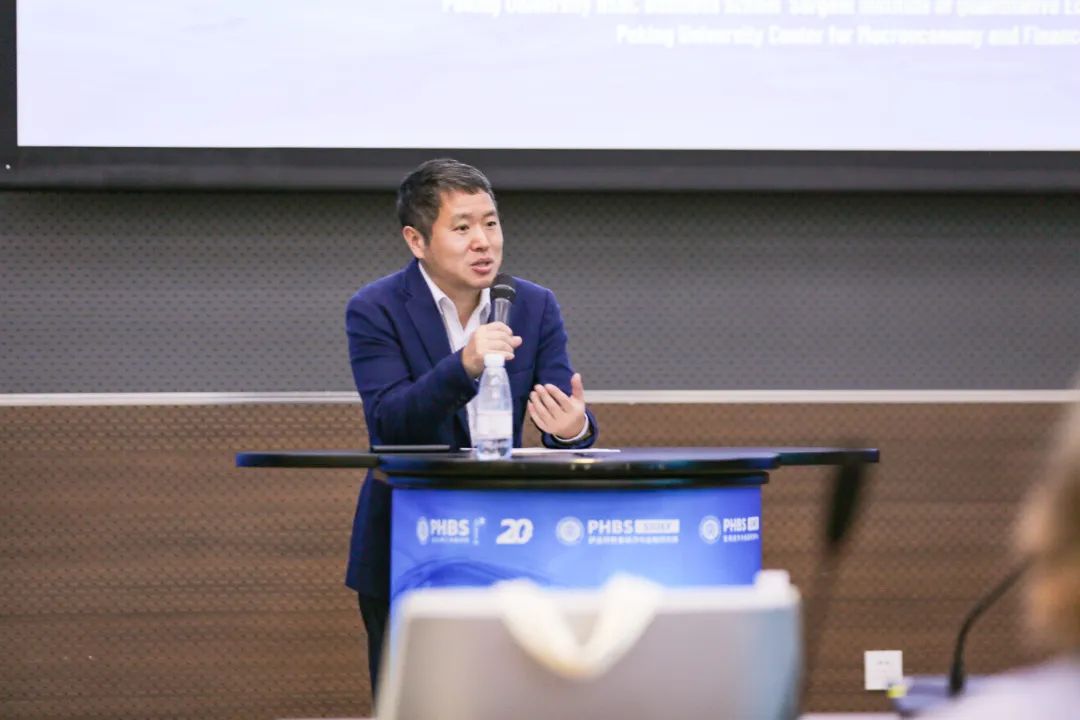
Professor Wang Pengfei delivers closing remarks
On behalf of the organizers, Professor Wang Pengfei, dean of PHBS, expressed sincere gratitude to all the participants. He introduced the student cultivation and employment of the school’s master’s and doctoral programs, and expressed the hope to strengthen academic exchanges and promote cutting-edge research through this annual event.
Group photo of the participants
Initiated in 2018, PHBS Workshop in Macroeconomics and Finance has provided an effective platform for some of the most prominent scholars and young researchers to promote academic exchanges among macroeconomic and financial research institutions, deepen the understanding of China's macroeconomic and financial issues, and facilitate the application of research findings into China’s reform and development.
By Chen Man, Chen Bixiao, Cui Chang, Wu Wu, Li Tuoda, Yin Huanyu, Yang Zijun, and Annie Jin





